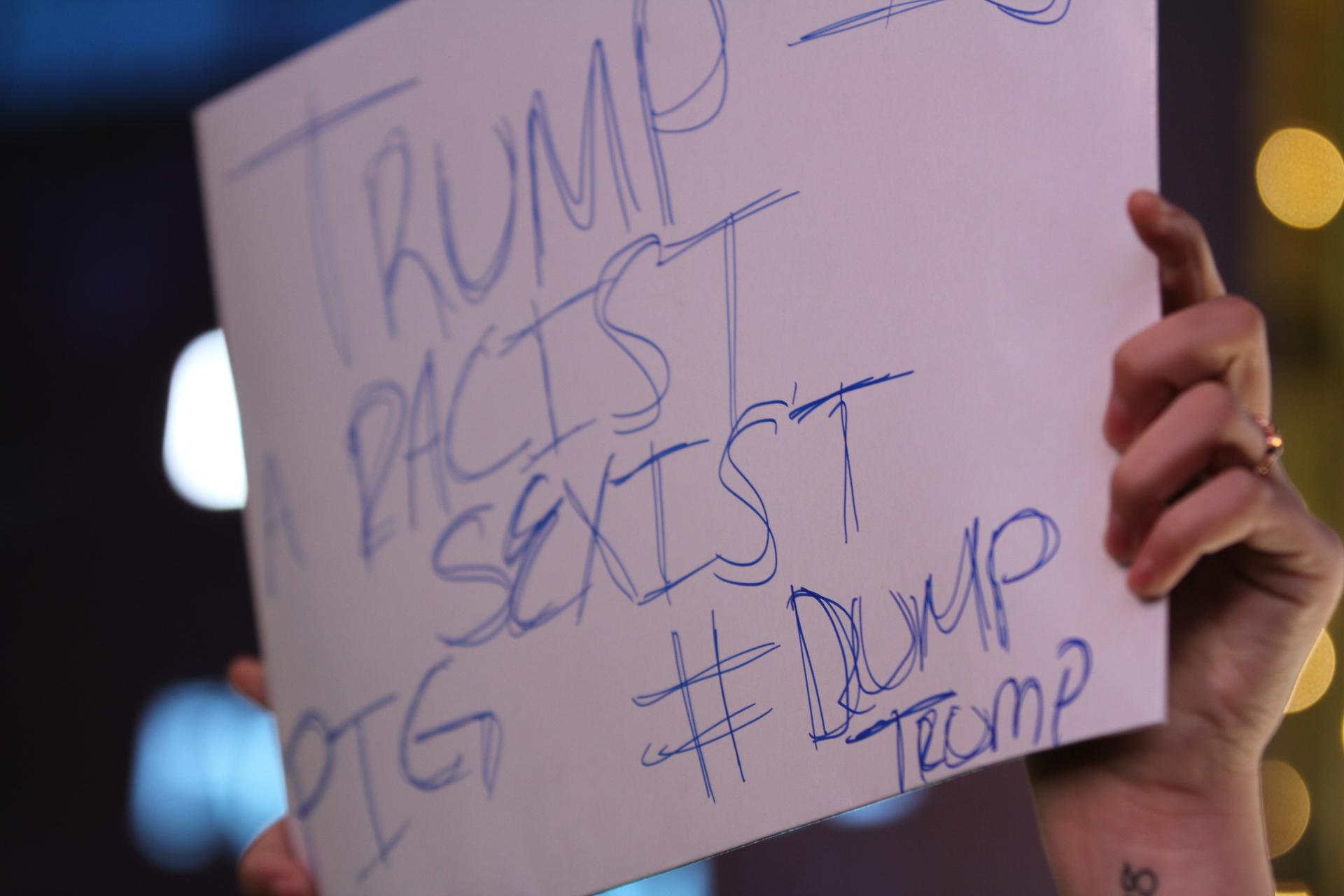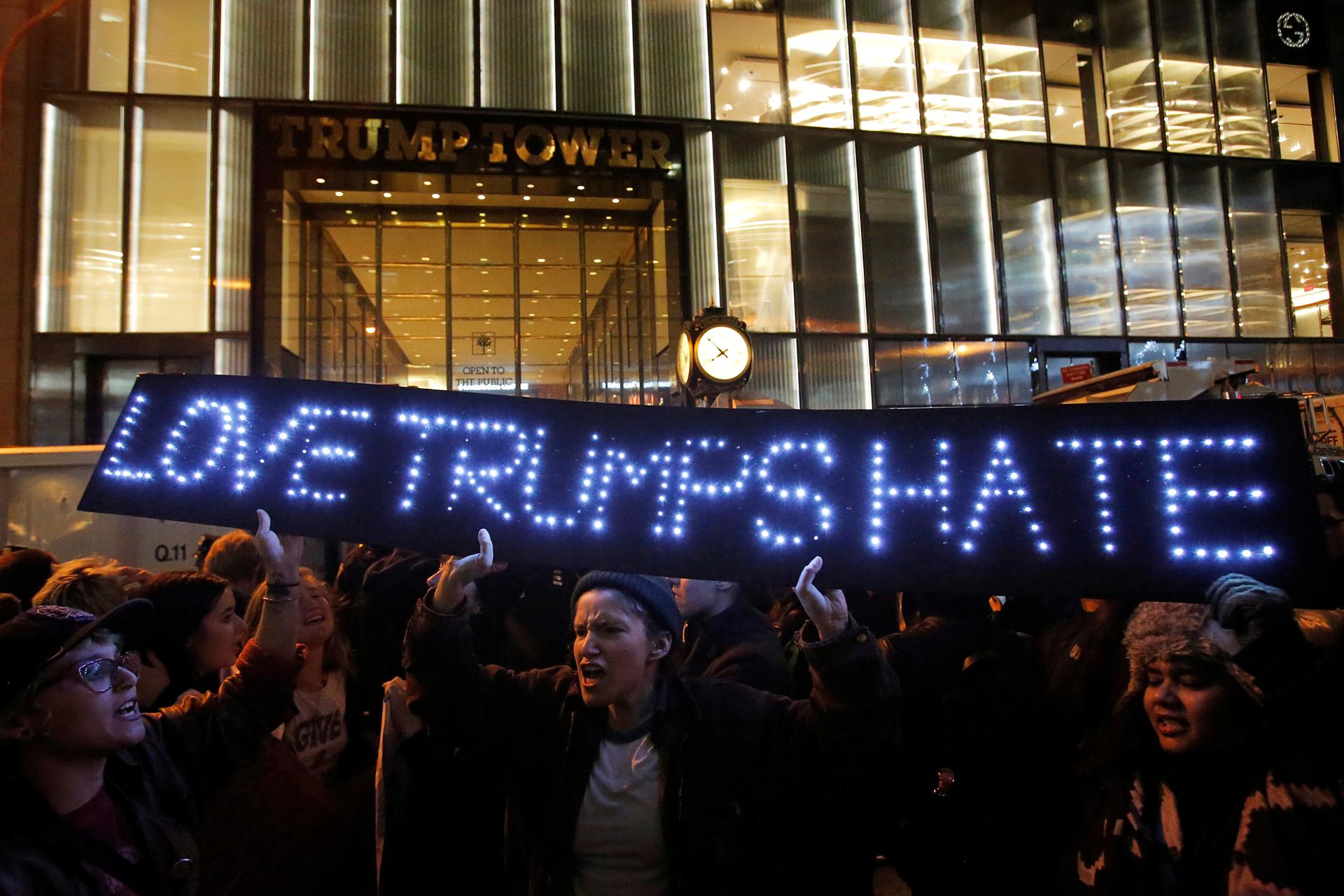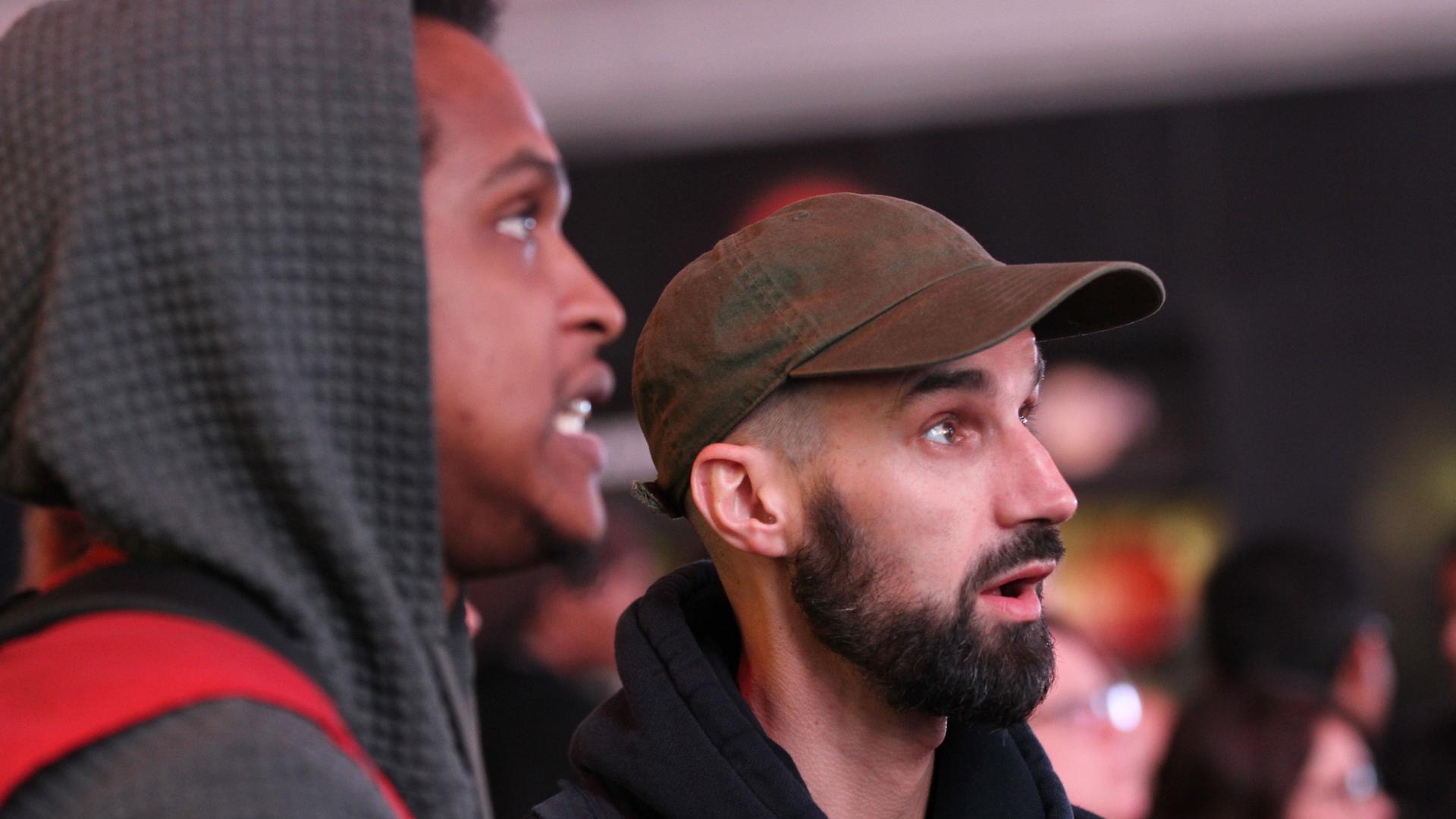Millennials respond to a president most of them did not vote for
Trump takes Florida, and the crowd in Times Square reacts.
In New York City’s Times Square, sandwiched between both campaigns’ Election Night headquarters, some young voters struggled — and failed — to hold back tears as they watched Republican Donald Trump, who was supported by only 37 percent of millennials, elected president of the United States.
Kay James, an 18-year-old New York University freshman, said that for her and a group of peers who had previously been waving “#DumpTrump” posters, the results were “kind of terrifying.”
However, among young Trump supporters there was hope for changing what they consider a political system stacked against them.
Northwestern University sophomore Grant Papastefan — who voted for Ohio Gov. John Kasich in the primaries but ultimately supported Trump — said in a telephone interview that “Trump had an impassioned message” and “he truly wanted to help.”
Still, Papastefan and other students interviewed were surprised by the Republican upset.

David Rothschild, an economist at Microsoft Research who runs PredictWise, an online forecasting model, had predicted an overwhelming Clinton win. But after a “relentless media pursuit” undermined her credibility, he said, young voters flocked to third party candidates and may have cost Clinton the election.
Libertarian Gary Johnson and Green Party nominee Jill Stein performed strongest among under-30 voters, winning 5 percent and 2 percent of their vote, respectively.
“Obviously, 16 years later, the lessons of Ralph Nader [who took votes away from Al Gore in 2000, many say] were lost on the younger generation,” Rothschild said. “They saw an equivalent, bad set of choices, and voted third party.”
Rothschild said lack of enthusiasm for Clinton among young voters in key battleground states added to her troubles. Clinton won support from 18 to 29-year-olds by only 55 percent compared with President Barack Obama’s 66 percent in 2008.
Young women, however, overwhelmingly backed Clinton 63 percent to Trump’s 31 percent.
Late Wednesday, when Clinton officially conceded the election, she addressed those women directly.
"To all the women, especially young women … nothing has made me prouder than to be your champion,” she said, her voice cracking with emotion. “We have still have not shattered that highest and hardest glass ceiling. But some day, someone will.”
READ MORE: Three reasons some young women are sticking with Trump
Some students who spent Tuesday evening at watch parties and election rallies worried Trump’s platform would create a harmful environment for women and minorities in the country, even as their peers argued the Washington outsider with no prior political experience is just what America needs.
“We're electing someone who doesn't have a plan,” NYU freshman Jasmine Briscoe said of Trump, shaking her head, as she stood in Times Square early Wednesday. “He has just been saying things to get people riled up and it's working, and that's how he was able to win. But once he gets in office, what's he actually going to do?”
Addressing a raucous crowd of supporters at around 3 a.m., the president-elect sought to unify a divided nation — assuring voters he would work for everyone.
“The forgotten men and women of our country will be forgotten no longer,” Trump told supporters in New York. “Now it’s time for America to bind the wounds of division. It is time for us to come together as one united people.”
READ MORE: Millennials have to wonder: Have baby boomers ruined everything?
The country’s divisiveness is a key issue first-time voters said they wanted fixed. But Trump’s promises to build a “big, beautiful wall” on the US-Mexico border and temporarily ban Muslims worry some college students.
“I think it's going to give a ton of people excuses to say and do hateful things,” Briscoe said. “They're going to be able to say, ‘Well our president said it, so we can say it.’ The state of the nation is going to change and people who are closeted about their racism are going to be open now.”
But while Papastefan, the 19-year-old Northwestern student, admitted he had “concerns” about some of Trump’s remarks, he said the president-elect was not “this racist, sexist, homophobic, xenophobic person they painted him to be.”

Papastefan said he looked forward to the coming years, as Republicans now control both chambers of Congress and the White House.
“We have a lot of things we need to repair,” he said. “We’re going to be able to shrink our government and redefine what social programs are human rights and which are just political ploys.”
Some young Republicans who identify with the party but not their new president-elect said control of Congress was a silver lining. Hayden Vick, a 20-year-old student at the University of North Carolina at Chapel Hill, rejected Trump’s values, but recognized the potential for good in a GOP controlled Washington.
“Even if I don't support everything that Donald Trump stands for, I support the Republican party,” he said. “And if we hold the presidency, Senate and the House, I guess a part of me believes everything will be okay.”
And back in Times Square, surrounded by dejected Clinton supporters turning away from glittering TV screens and gloomy results, NYU student Kay James forced a smile as she also tried to project optimism for the future.
“In the end, I think everything's going to be just as it was, you know?” she said. “There's more to it than just the presidency. … Trump’s going to rely on his advisors to really make decisions for him, so maybe things will be reasonable.”
